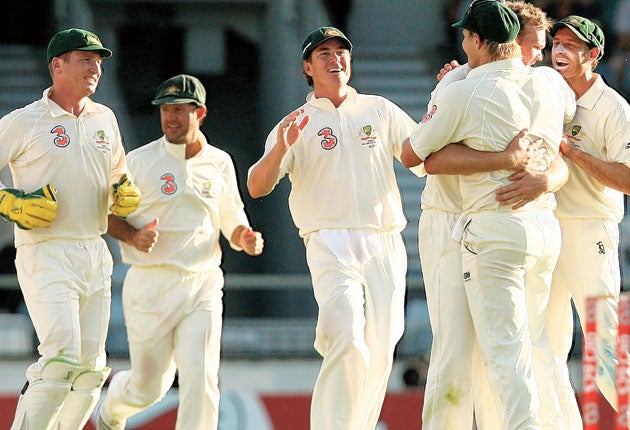Australia players in dispute with authorities over IPL salary levy

Australian players have threatened not to sign contracts with Cricket Australia next year if the board deducts 10 per cent from their Indian Premier League salaries.
The IPL governing council, in a meeting on Sunday to discuss the rules and regulations for the fourth season of the league, had ruled that 10 per cent of players' salaries would go to their respective countries' boards.
The Australian Cricketers' Association chief executive Paul Marsh said: "[We have] made it known to Cricket Australia [CA] that any attempt to take 10 per cent, or any other amount for that matter, from the IPL salaries of Australian players is completely unacceptable and will be opposed in the strongest possible way by us.
"CA simply has no right to effectively charge a commission on income earned by players from outside their employment to CA. Should they seek to do so, we would expect players to give serious consideration to either not signing an IPL contract that contains this deduction, or not signing future CA contracts."
Cricket Australia, the governing body of the game in the country, presently deducts 2.5 per cent of players' IPL salaries. Marsh urged CA not to honour the new deal, and said: "Regardless of the decision made by the IPL, we would hope CA would act in good faith to its players by not taking this proposed 10 per cent."
The latest move by the Board of Control for Cricket in India (BCCI) to deal directly with the boards has been understood to be aimed at keeping players' agents out of the loop.
The BCCI president, Shashank Manohar, had earlier said: "All player contracts will now be managed by BCCI and signed by BCCI along with the franchise and the player. A new player registration and contract management process will be detailed soon. No player contracts can be signed until then. Player regulation for the 2011 season will be circulated soon to all franchisees which will detail the player contract, registration and signing process."
Meanwhile, the India captain, Mahendra Singh Dhoni, said yesterday that cricketers must take more responsibility for their actions to prevent the spread of corruption. He was speaking in the light of the suspension last week of Pakistan players Salman Butt, Mohammad Aamer and Mohammad Asif following spot-fixing allegations levelled against them in the News of the World.
"It is crucial to keep the game clean," Dhoni said. "Personally, I think it is up to the individual. You don't need someone to guide you or restrict you. If you are playing for, or representing, your country you should feel pride in doing that."
In the wake of the allegations against the Pakistan trio, the International Cricket Council's Anti-Corruption and Security Unit (ACSU) has come under fire for not doing enough to prevent the spread of corruption in cricket.
But Dhoni, who is in South Africa with the Chennai Super Kings to play in the Champions League Twenty20 which starts on Friday, believes that the ACSU is doing a decent job. "As far as the corruption unit and their functioning are concerned I think that they are doing a good job," he said, adding that if the ACSU was given more power it could infringe on players' human rights. I think that if they [ACSU] become stricter they will start intruding on the privacy of players."
Flag-waving and rifle shots greeted Afghanistan's Twenty20 tournament victory in Pakistan on Monday.
Afghanis danced in the streets to celebrate a famous win in Karachi in their debut at one of the most prestigious events on the T20 night circuit. "It is a great feeling to win in Pakistan against a strong team," player Asghar Stanikzai said. "You look at the support we have had and perhaps it is time other cricket-playing nations took us seriously."
A 61-run win against a team that included Pakistan stars Imran Nazir and Rana Naved underlined Afghanistan's emergence as a cricketing force.
Their support was infectious with thousands of Afghani immigrants, including young children who live in Karachi, supporting their team every night of the tournament.
On the final night, they jubilantly waved their national flags while the more adventurous didn't hesitate to fire bullets into the air to celebrate a six or a wicket.
Even the heavy presence of security personnel at the venue failed to dampen the spirits of the Afghanis with thousands more fans waiting outside to get in as the police and paramilitary rangers struggled to prevent any crowd surges.
Young pace bowler Hamid Hassan brought the stadium to its feet by taking three wickets in one over to highlight the cricket talent in the war-torn country.
Abdullah Noor, who was forced to seek refuge in Pakistan after the Soviet invasion, came to Karachi in the 1980s and works as a cloth merchant. He said cricket had been a big unifying force.
"When our cricketers play anywhere in the world, Afghanis, whether they are refugee or immigrants, are united," he said.
Subscribe to Independent Premium to bookmark this article
Want to bookmark your favourite articles and stories to read or reference later? Start your Independent Premium subscription today.

Join our commenting forum
Join thought-provoking conversations, follow other Independent readers and see their replies